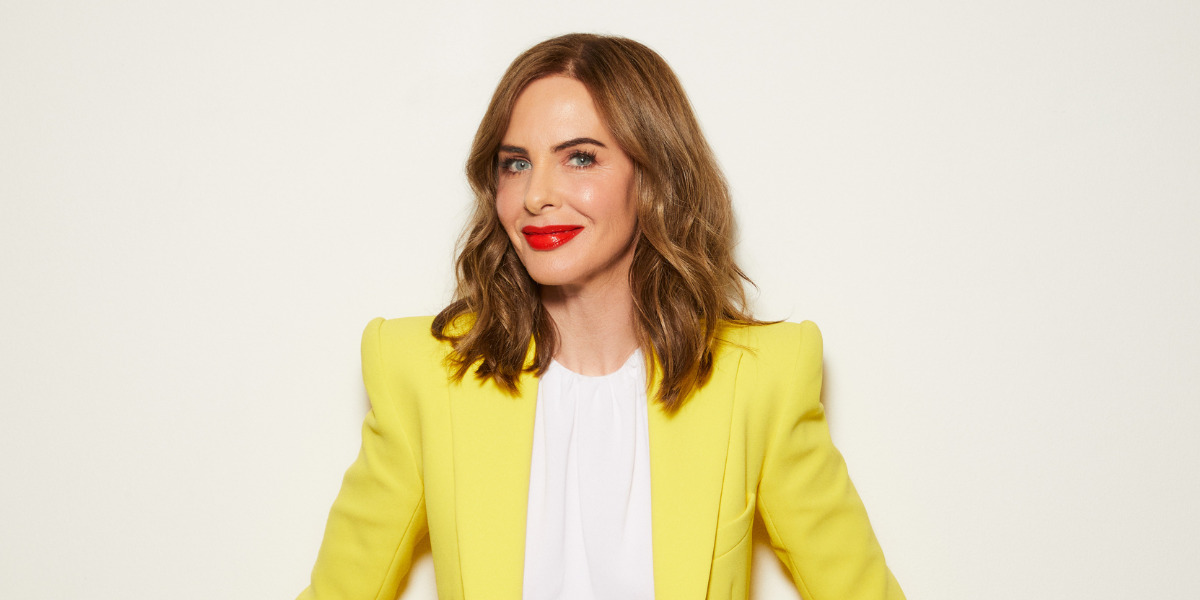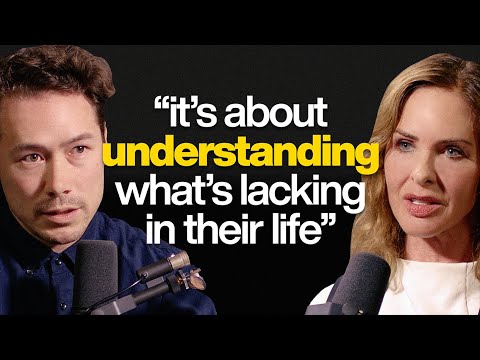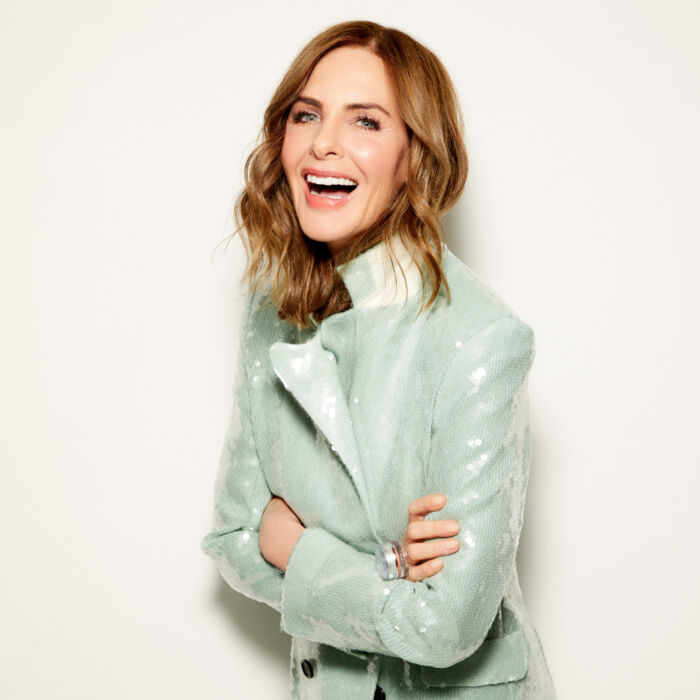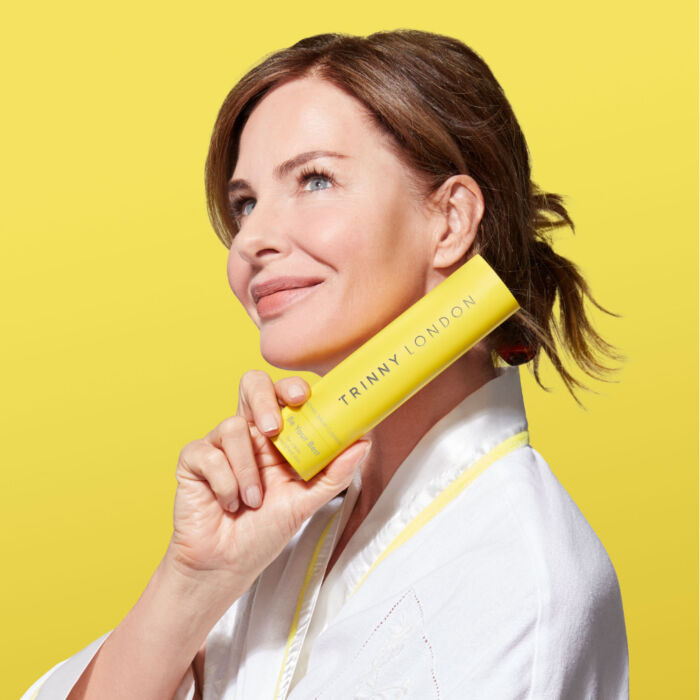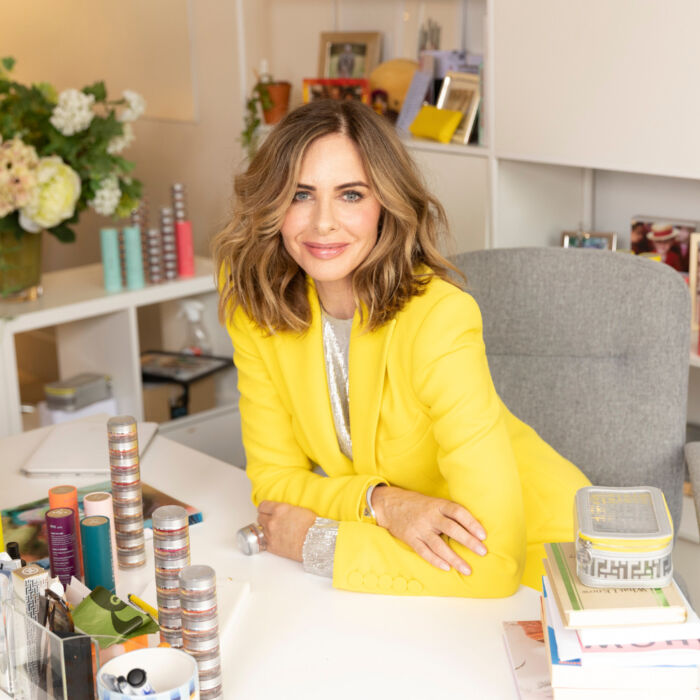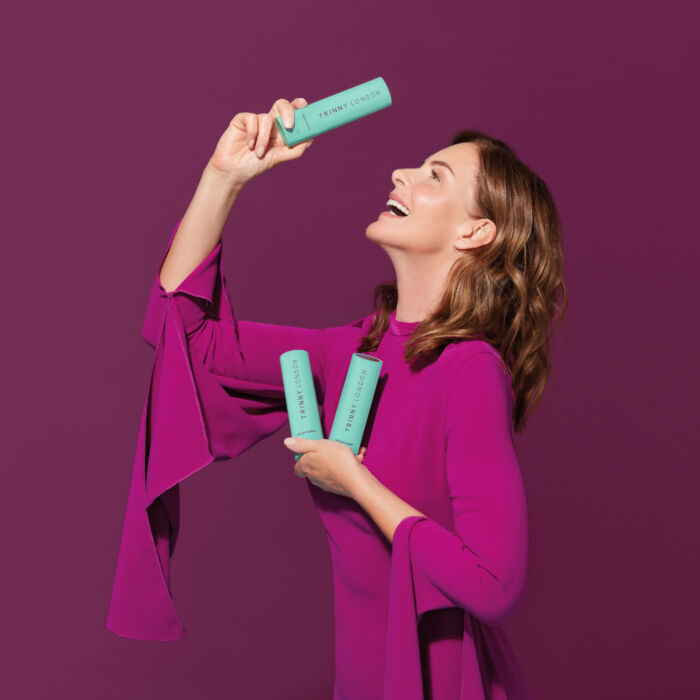When Foundr CEO Nathan Chan first spoke with Trinny Woodall about launching her beauty brand, Trinny London, he asked why she started with so many products.
The answer was simple.
“We’re in makeup, darling.”
Woodall is confident, direct, ambitious, and fabulous before fabulous was cool. She knows what she’s doing because she knows her customers.
Since 1997, she’s been helping women see themselves as more beautiful via her roles as a columnist, television presenter, and now, founder. Her unique design of stackable makeup pots established Trinny London as a brand that gives everyone the tools they need to feel their best. Since launching in 2017, Trinny London has had 120 percent year-over-year growth, sales in 180 countries, and a team of 200 employees.
A television celebrity starting a beauty brand may seem normal in today’s star-studded entrepreneurship market. For Woodall, however, establishing her business was an idea that began in her early 30s and took until her 50s to fulfill.
It started with opening up her closet.
Closet Raid
In 2012, Woodall was at the peak of her TV career, with hit shows and best-selling books (including The Body Shape Bible, What You Wear Can Change Your Life, and What Your Clothes Say About You) that helped empower women through fashion and beauty. Makeover after makeover, across borders and oceans, Woodall kept hearing the same thing from women.
“The thing women first noticed in a makeover was their makeup because many people have body dysmorphia to some greater or lesser degree,” Woodall says. “They have that uncomfortableness to look at themselves in a makeover and just come to terms with their body. And they’re going to go, ‘Wow, I feel better. I feel I look nice. I feel I can look at myself.’ And that made me think, ‘That’s what I got to start with.’”
From her decades of travel and on-the-go makeovers, Woodall had developed her makeup formulas and a stackable case system. She also knew there was a large demographic of women over the age of 35 entering new phases of life (motherhood, divorce, returning to the workforce, etc.) who needed help refreshing their makeup routines.
“I wanted to make it easy for them, portable for them. I wanted them to be able to buy it online, whatever their age,” Woodall says. “And I felt she [the target demographic] was underrepresented in the market.”
She planned to design a brand that allowed women to customize their makeup choices without the intimidation of a department store. Thankfully, this time, her audience could purchase the products directly online.
Although Woodall exudes confidence in person and on camera, she says during that period, she overthought her ideas because of her fear of failure.
“When you’re an entrepreneur, [getting] from the idea inside your head to the idea on the table is the hardest part. Because when it’s inside your head, you preserve its lack of failure,” Woodall says. “And as soon as you get it out on the kitchen table, you have to face the reality, warts and all, of how difficult that’s going to be, that journey. And are you prepared to have the courage to take it? Because to be an entrepreneur, you have to have passion, dedication, courage, and such resilience. And I had to be ready for that.”
…to be an entrepreneur, you have to have passion, dedication, courage, and such resilience.
Woodall says she started her beauty brand, Trinny London, at the worst possible time. Her TV career was slowing down, she had a mortgage that she couldn’t afford on an entrepreneur’s salary, and she was entering her 50s, which was not the typical age of startup founders.
“I also knew that I could not not do it because I couldn’t look at myself 10 years later and think, ‘You never tried,’” Woodall says.
Four years after the initial idea, she applied for a British entrepreneurial program that helped her raise $150,000 for product development. But she quickly needed more money. Her business was barely an idea, and she says it wasn’t ready to pitch to investors. So she opened up her closet.
“I amassed 20 years of clothes from every fashion house,” Woodall says. “I didn’t give a s***. I opened my doors, and I said, ‘Come in and buy the clothes.’”
She raised enough money from emptying her closet to survive another year and get to prelaunch.
This time, Woodall wasn’t waiting for an escape phone call. She would make her idea a reality with the clothes off her back.
Trinny Tribes
Woodall says her celebrity status may have helped grow her business but didn’t help start it. During her prelaunch fundraising, she emailed 250 investors, got 49 meetings, and landed one commitment.
According to PitchBook, last year, U.S. female-led startups received less than 2 percent of funding from venture capital. Woodall says even industries like coal mining are less male-skewed.
She remembers going to meetings in Silicon Valley, and she’d be five minutes into her pitch when the investors inevitably asked, “How old are you?”
“And I go, ‘I’m 51.’ And they’d go, ‘OK.’ Five minutes later, we were out of the interview,” Woodall says.
I go, ‘I’m 51.’ And they’d go, ‘OK.’ Five minutes later, we were out of the interview.
Eventually, she got a first-round commitment of $2.2 million in funding and an additional round of funding for a total of $7.9 million raised. Her team immediately put woman after woman in front of a bathroom mirror. They went through 500 test subjects to hone their products and selection sequence, eventually called Match2Me. They narrowed the research to 49 products for their official launch, focusing on serving as many skin shades and face structures as possible.
If you’re a makeup novice like Nathan Chan, Woodall explains why they needed to launch with a minimum of 49 SKUs.
“So with makeup, you’ve got foundation and concealer, that’s 12. You’ve got this cream, which turns the color of your skin, which is six. You’ve got 12 eye shades. You’ve got six types of lipstick. You’ve got eight types of lip-to-cheek, you’ve got eight types of lip glow, and you’ve got eight types of lip luxe. That comes to 49,” Woodall says.
Since 2017, Trinny London has scaled its line to 77 products, including skincare, makeup, and accessories. Woodall credits the success of the business to the community that’s organically built around the brand—or, as she calls it, the Trinny Tribe.
“The success of the Trinny Tribe is that we didn’t start it,” Woodall says.
A few months before the launch of Trinny London, a woman from Northwest England named Kelly, a fan of Woodall, started a Facebook group called “Trinny Tribe.” Soon after the launch, more Trinny Tribe groups started popping up nationwide and in Europe.
The Trinny London team brought the groups together and regionalized them. Each group is managed by a fan called an “ambassadress.” Today, there are 34 Trinny Tribes in 17 countries.
“The true beauty of our community is that there’s a passion. And we inspire a passion for them to make the most of themselves,” Woodall says. “But that community itself fosters lifting up women.”
The success of the Trinny Tribe is that we didn’t start it.
While the Trinny Tribes receive a sneak peek of products and discounts, there is no transactional relationship with the business.
“There’s a certain commercialization which doesn’t allow for better organic growth. And I think something like this, you want to let that organic growth flourish,” Woodall says. “They’re our biggest advocate and our biggest critic. So we know quite quickly if something is happening that we need to look at. [And] we know if something is resonating immediately.”
Woodall suggests that early-stage founders invest in platforms like Facebook groups over TikTok or Instagram because it fosters two-way communication and collaboration. The Trinny London community team answers 13,000 comments weekly, and Woodall will personally answer some comments and questions herself. Woodall says the practice reminds her of the needs of hundreds of women she did makeovers for.
“Whether it’s Gen Z or millennial or baby boomer, if you’re talking about something that people are thinking about, they look to hear more,” Woodall says. “It might be a great product, and you might feel you have got a point of difference in the market, but go out and see where people are buying whatever it is you’re selling and how they are selling it.”
How to Start a Beauty Brand
In the United States, the beauty industry is valued at $805.61 billion, and YouTube watch times for makeup transformations double each year.
Woodall says it’s much easier to get started than when she began her journey in the late 90s, but now it’s more challenging to capture and convert a customer.
“In the world we live in today, packaging and branding can definitely get a product off the ground, but they will never make it a legacy brand,” Woodall says. “You don’t want to have something in five years just die. I think we all want to have something that becomes established.”
Woodall believes emotional intelligence is what sells a brand.
“It’s a mixture of honing in on an audience that feels it hasn’t been spoken to and speaking with a message that resonates,” Woodall says. “Because there’s a lot of noise out there. There are a squillion beauty brands. There’s a ton of online beauty brands. And there’s a ton of legacy beauty brands. So it’s about how do you cut through?”
For as much as the product is the focal point of any business, Woodall says the brand needs to have an emotional draw because that’s why people buy. It’s also why there’s a shift happening from click to brick.
“The challenge for DTC brands now is whatever market you’re targeting, people need to trust you as a brand and believe what you are,” Woodall says. “They need to see the physical manifestation of the DTC brand. And if they don’t see it, it’s like it’s here today and gone tomorrow.”
The challenge for DTC brands now is whatever market you’re targeting, people need to trust you as a brand and believe what you are.
That’s why Trinny London is investing in kiosks and pop-ups across its target markets and still commits to organic marketing tactics over paid advertising.
“We have so many people just throwing money at advertising, and they’re wondering why there’s no traction,” Woodall says. “Only when you feel that traction is there should you really get to paid [advertising]. Otherwise, you’re putting money down the toilet.”
One tactic Woodall suggests: Instead of spending coveted cash with influencers or content creators, offer them a stake in your business.
“Then they’re like, ‘Hey, I can make money when I sleep.’” Woodall says. “The concept of making money when you sleep is very different when you’re a performer. So it’s just how can you think more cleverly than just, ‘I’ll do an Instagram ad.’”
Even though Trinny London’s target demographic is not using platforms like TikTok, she’s always considering where to reach her future customers. Her teenage daughter recently helped her create a viral TikTok video that gained 2 million views and showed Woodall demystifying a conspiracy about Zara’s sizes.
@trinnywoodall♬ original sound – Trinny Woodall
“How do you make sure those people who are currently 30, that when they become 35, 40, we will be the brand that resonates with them?” Woodall says. “Because otherwise, you grow old with your customer, and then you fall off a cliff.”
Trinny London is also investing in AI tools to help curb the drop-off they see while using their Match2Me tool.
“[With AI] we can take over for you [when] you’re not sure of what answer to give, which might delay you completing it. We will actually help you,” Woodall says.
While Woodall never stops innovating, she says any brand must always return to its mission and core audience.
“You want things that are relevant for your audience [and] that they know will help them to get to a solution,” Woodall says. “Just to do it for a game or just to do it to keep up with the crowd isn’t the reason to do it.”
Last year, Trinny London expanded its line to skincare, which is now 35 percent of the company’s revenue. Woodall’s long-term goal is to eventually exit as one of the largest beauty brands in the world.
“That’s the burden you carry as an entrepreneur. It’s kind of never enough,” Woodall says. “If you know you’re giving it your all, then it’s to remember you never know what’s behind the closed door.”
Or an open closet.
The post Why Trinny Woodall Still Replies to Customer DMs appeared first on Foundr.
